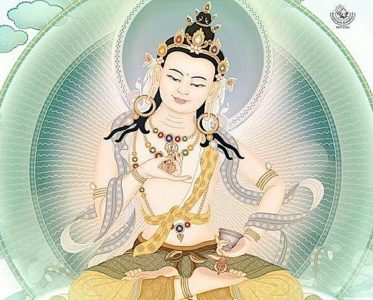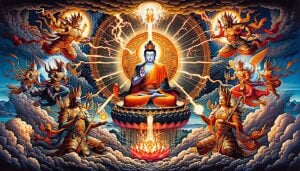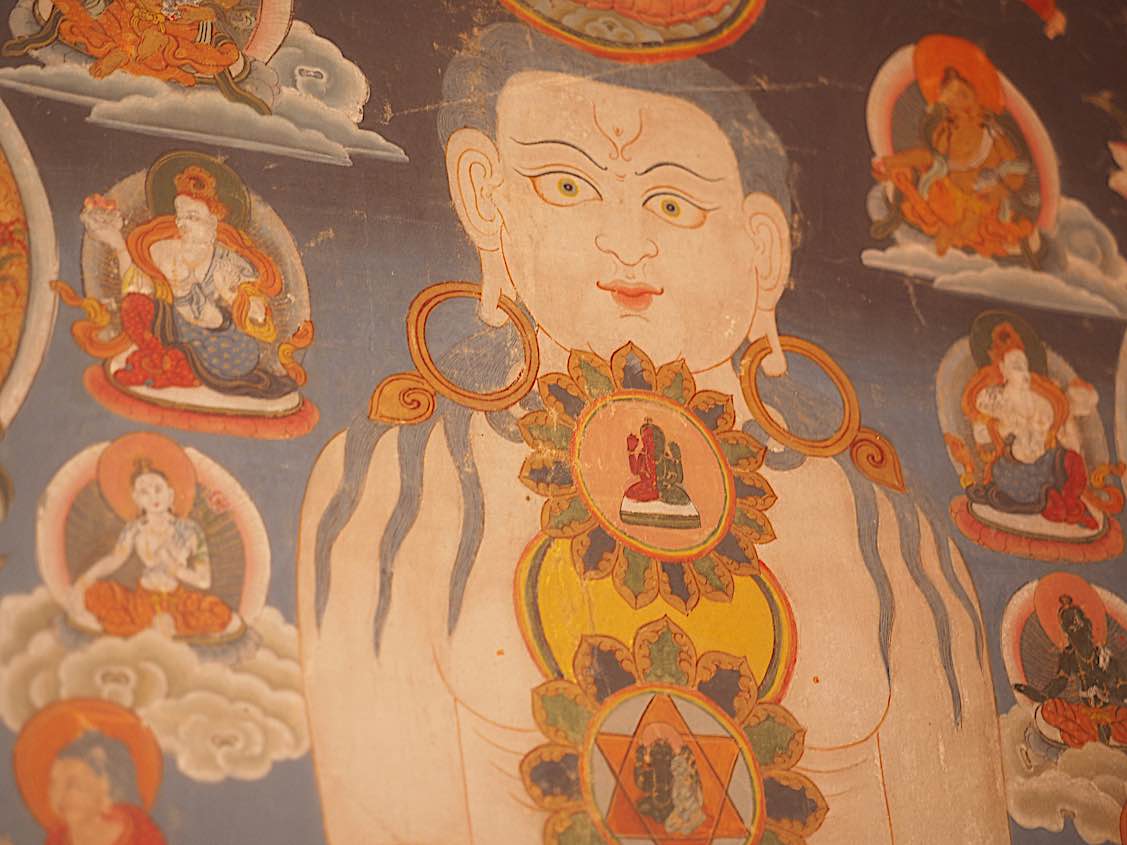Advice from the Teachers: How do we purify negative karma? Do you have advice for people confused by karma?
In the first of a new video series, Venerable Acharya Zasep Tulku Rinpoche answers a question from a student about Karma:
Do you have any advice for people who are confused about karma? How do we purify negative karma?
Transcript of Venerable Zasep Tulku Rinoche’s answer on the question of Karma.
 Okay, question about Karma. It’s a very good question. The word Karma you can find in the dictionary, online, Wikipedia and so forth. A lot of people in the west use the word Karma now.
Okay, question about Karma. It’s a very good question. The word Karma you can find in the dictionary, online, Wikipedia and so forth. A lot of people in the west use the word Karma now.
Many years ago I was travelling in Alaska, between Anchorage and Fairbanks, we gave a ride for a young hitch hiker. We didn’t say anything about Buddhism. He doesn’t know I am a Lama, because I wasn’t wearing Lama dress or outfit. When he got out of the car, he said, “Thank you very much. Good Karma for you.”
Not Just Body Karma, What You Think Creates Karma
So, I thought, wow, this man knows about Karma. He somehow assumed that we know about Karma. So many people use the word Karma. I think understanding Karma is important, because Karma actually means “action”: action of the body, action of the mind, cause and effect. We call it Law of Cause and Effect. Whatever we do with our bodies. And whatever we think about in our mind, how we perceive, how we judge, how we interpret things — that has effect in our mind, and effect on our daily life. That’s why we call it Cause and Effect.
There is positive Karma and negative Karma. If you create positive Karma then virtues and good things will happen to us. If we keep creating negative karma, then suffering will come, sooner or later to us. So, in some ways, Karma is not that hard to understand. In some ways it is very difficult to understand.
Karma is Not About Punishment
 In the West, sometimes people misinterpret the word Karma. People say, “Well, that’s your Karma.” Then, people think, “This is your fault!” or “You deserve it” and you are being punished — kind of like that. You don’t have to be punished. You don’t have to suffer all the time. Before Karma “Arrives” you can purify “Karma.” I’m not saying all the Karmas of the past. We don’t know how many Karmas we created in the past. Sometimes you may have more Karmas than you thought. Sometimes you think you have less (than you do). We don’t know.
In the West, sometimes people misinterpret the word Karma. People say, “Well, that’s your Karma.” Then, people think, “This is your fault!” or “You deserve it” and you are being punished — kind of like that. You don’t have to be punished. You don’t have to suffer all the time. Before Karma “Arrives” you can purify “Karma.” I’m not saying all the Karmas of the past. We don’t know how many Karmas we created in the past. Sometimes you may have more Karmas than you thought. Sometimes you think you have less (than you do). We don’t know.
Only way to find out — you look at your mind. If your mind is clear and good, then that means your mind didn’t create so many bad Karmas in a past life. If you look at your body, your health, and your life — if you have a good life, good health — that means you haven’t created too many bad Karmas, physically, in the past lives.
Karma Can Take Years to Ripen
Of course, some things we cannot judge. Some Karmas cannot be interpreted. We don’t know. It takes a number of years, many years, and many lifetimes to process the Karma, Cause and Effect, and to experience the result of Karma. We don’t know, it may take many lifetimes.
In any case, even if you have a Karma that will ripen in the future — maybe one life, two lives down the road — you can purify it now.

You Can Purify Bad Karmas Now
This is why we do purifications such as Vajrasattva practice, and meditation on loving kindness, and do meritorious actions: practice generosity, giving food and medicines, give Dharma teachings for other people. You can always create Good Karma to purify unwholesome Karma of the past.
I want to say a few words about Karma. There’s another word, you could say, “Instant Karma.” Some Karmas are not really instant. [If they are] you can see, right away, the result of Karma.
The Hitch Hiker Karma Test
 If somebody says “How do I know that Karma works? Just go down to the highway and hitch hike. Then you’ll find out your Karma. That’s quick Karma. Almost like “Instant Karma.” Or, if you’re driving carelessly, going through a red light or whatever, you could have accident, or at least you get booked, get a ticket. (Snaps finger). Those are almost “Instant Karma.” You can see the results right away! So, therefore, sometimes Karma is not that difficult to understand how it works.
If somebody says “How do I know that Karma works? Just go down to the highway and hitch hike. Then you’ll find out your Karma. That’s quick Karma. Almost like “Instant Karma.” Or, if you’re driving carelessly, going through a red light or whatever, you could have accident, or at least you get booked, get a ticket. (Snaps finger). Those are almost “Instant Karma.” You can see the results right away! So, therefore, sometimes Karma is not that difficult to understand how it works.
In Part 2 of this Series, a student asks Rinpoche “What advice would you g for a student who is dealing with the loss of a loved one?”
This is the first in the new Buddha Weekly video series:
Advice from the Teachers; Questions from the students.
Each five minute video will take a question from a student — including you, if you send us your questions (here>>) — and ask an authorized teacher for a short answer (five to ten minutes) video recorded.
PREVIOUS BUDDHA WEEKLY ADVICE FROM THE TEACHERS VIDEOS:
Video 1: Advice for Students on Karma>>
Video 2: Advice for Students dealing with loss of a loved one>>
Video 3: Advice for Students coping with memory loss, Alzheimers or early dementia>>
Video 4: Advice for Students coping with the loss of a beloved pet>>
Video 6: Advice for the New Student to Buddhism>>
Video 7: Advice for Keeping Motivated in Your Daily Practice>>
Video 8: Purifying Negative Karma>>
Video 9: Advice for Advanced Vajrayana Students on Managing Commitments>>
2 thoughts on “Advice from the Teachers: How do we purify negative karma? Do you have advice for people confused by karma?”
Leave a Comment
More articles by this author
Search
Latest Features
Please support the "Spread the Dharma" mission as one of our heroic Dharma Supporting Members, or with a one-time donation.
Please Help Support the “Spread the Dharma” Mission!

Be a part of the noble mission as a supporting member or a patron, or a volunteer contributor of content.
The power of Dharma to help sentient beings, in part, lies in ensuring access to Buddha’s precious Dharma — the mission of Buddha Weekly. We can’t do it without you!
A non-profit association since 2007, Buddha Weekly published many feature articles, videos, and, podcasts. Please consider supporting the mission to preserve and “Spread the Dharma." Your support as either a patron or a supporting member helps defray the high costs of producing quality Dharma content. Thank you! Learn more here, or become one of our super karma heroes on Patreon.
Venerable Zasep Rinpoche
Author | Buddha Weekly
Rinpoche is spiritual head of many Dharma Centres, and teaches around the world. Originally from Kham province in Tibet (born 1948) Rinpoche has taught in the west since 1976, after he was first invited by Geshe Thubten Loden and Lama Yeshe to teach at the Chenrezig Institute in Australia. Today, he is spiritual head of the Gaden for the West centres in Canada, U.S., and Australia and also spiritual director of the the charities Gaden Relief Project (Canada) and Manlha Tus NGO (Mongolia). He is the author of three books, including his latest release in 2018 with a rare English commentary and practice instructions for Gelug Mahamudra.















Thank you very much for making these teachings available online in this way. I greatly appreciate them
Could I ask, when choosing the music for the introduction, what was the general concept?
It doesn’t bear any resemblance to Tibetan music, rather more Chinese style.
I hope you don’t mind me pointing that out.
Thank you for your kind words. We are using stock music library, nothing really Tibetan in the service we use. We’ll keep an eye out for a source in future. Thanks again.